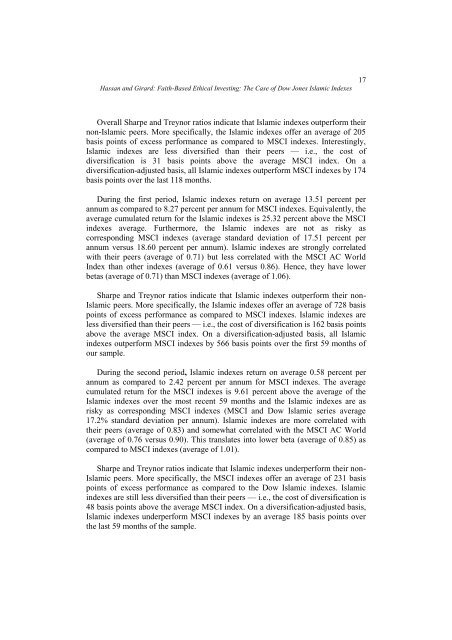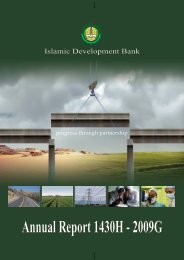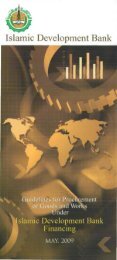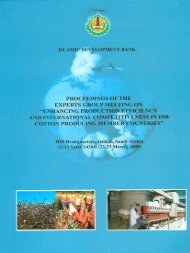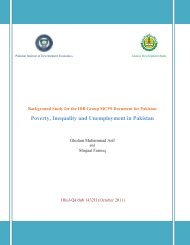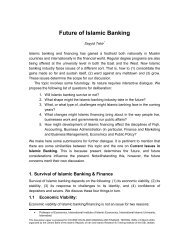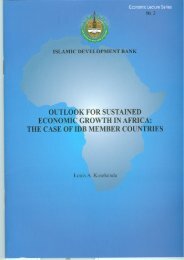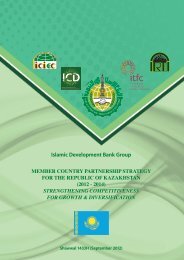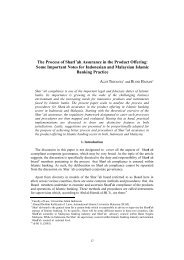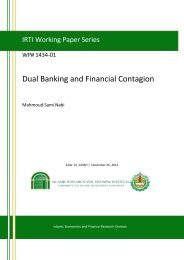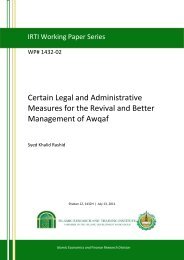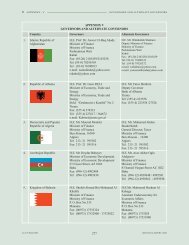faith-based ethical investing: the case of dow jones islamic ... - IRTI
faith-based ethical investing: the case of dow jones islamic ... - IRTI
faith-based ethical investing: the case of dow jones islamic ... - IRTI
- No tags were found...
You also want an ePaper? Increase the reach of your titles
YUMPU automatically turns print PDFs into web optimized ePapers that Google loves.
Hassan and Girard: Faith-Based Ethical Investing: The Case <strong>of</strong> Dow Jones Islamic Indexes17Overall Sharpe and Treynor ratios indicate that Islamic indexes outperform <strong>the</strong>irnon-Islamic peers. More specifically, <strong>the</strong> Islamic indexes <strong>of</strong>fer an average <strong>of</strong> 205basis points <strong>of</strong> excess performance as compared to MSCI indexes. Interestingly,Islamic indexes are less diversified than <strong>the</strong>ir peers — i.e., <strong>the</strong> cost <strong>of</strong>diversification is 31 basis points above <strong>the</strong> average MSCI index. On adiversification-adjusted basis, all Islamic indexes outperform MSCI indexes by 174basis points over <strong>the</strong> last 118 months.During <strong>the</strong> first period, Islamic indexes return on average 13.51 percent perannum as compared to 8.27 percent per annum for MSCI indexes. Equivalently, <strong>the</strong>average cumulated return for <strong>the</strong> Islamic indexes is 25.32 percent above <strong>the</strong> MSCIindexes average. Fur<strong>the</strong>rmore, <strong>the</strong> Islamic indexes are not as risky ascorresponding MSCI indexes (average standard deviation <strong>of</strong> 17.51 percent perannum versus 18.60 percent per annum). Islamic indexes are strongly correlatedwith <strong>the</strong>ir peers (average <strong>of</strong> 0.71) but less correlated with <strong>the</strong> MSCI AC WorldIndex than o<strong>the</strong>r indexes (average <strong>of</strong> 0.61 versus 0.86). Hence, <strong>the</strong>y have lowerbetas (average <strong>of</strong> 0.71) than MSCI indexes (average <strong>of</strong> 1.06).Sharpe and Treynor ratios indicate that Islamic indexes outperform <strong>the</strong>ir non-Islamic peers. More specifically, <strong>the</strong> Islamic indexes <strong>of</strong>fer an average <strong>of</strong> 728 basispoints <strong>of</strong> excess performance as compared to MSCI indexes. Islamic indexes areless diversified than <strong>the</strong>ir peers — i.e., <strong>the</strong> cost <strong>of</strong> diversification is 162 basis pointsabove <strong>the</strong> average MSCI index. On a diversification-adjusted basis, all Islamicindexes outperform MSCI indexes by 566 basis points over <strong>the</strong> first 59 months <strong>of</strong>our sample.During <strong>the</strong> second period, Islamic indexes return on average 0.58 percent perannum as compared to 2.42 percent per annum for MSCI indexes. The averagecumulated return for <strong>the</strong> MSCI indexes is 9.61 percent above <strong>the</strong> average <strong>of</strong> <strong>the</strong>Islamic indexes over <strong>the</strong> most recent 59 months and <strong>the</strong> Islamic indexes are asrisky as corresponding MSCI indexes (MSCI and Dow Islamic series average17.2% standard deviation per annum). Islamic indexes are more correlated with<strong>the</strong>ir peers (average <strong>of</strong> 0.83) and somewhat correlated with <strong>the</strong> MSCI AC World(average <strong>of</strong> 0.76 versus 0.90). This translates into lower beta (average <strong>of</strong> 0.85) ascompared to MSCI indexes (average <strong>of</strong> 1.01).Sharpe and Treynor ratios indicate that Islamic indexes underperform <strong>the</strong>ir non-Islamic peers. More specifically, <strong>the</strong> MSCI indexes <strong>of</strong>fer an average <strong>of</strong> 231 basispoints <strong>of</strong> excess performance as compared to <strong>the</strong> Dow Islamic indexes. Islamicindexes are still less diversified than <strong>the</strong>ir peers — i.e., <strong>the</strong> cost <strong>of</strong> diversification is48 basis points above <strong>the</strong> average MSCI index. On a diversification-adjusted basis,Islamic indexes underperform MSCI indexes by an average 185 basis points over<strong>the</strong> last 59 months <strong>of</strong> <strong>the</strong> sample.


